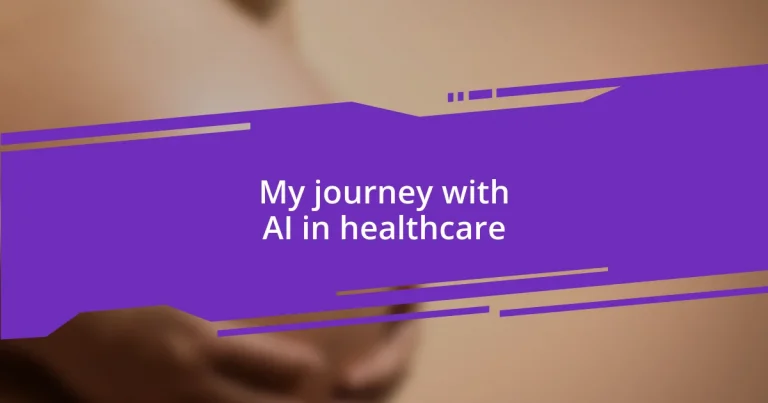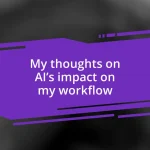Key takeaways:
- AI enhances diagnostic accuracy and treatment personalization, leading to improved patient outcomes.
- Integrating AI faces challenges, including data privacy concerns and staff skepticism, which can be overcome through demonstration and collaboration.
- Continuous learning and effective storytelling are vital for embracing AI’s potential in healthcare and gaining acceptance from colleagues.
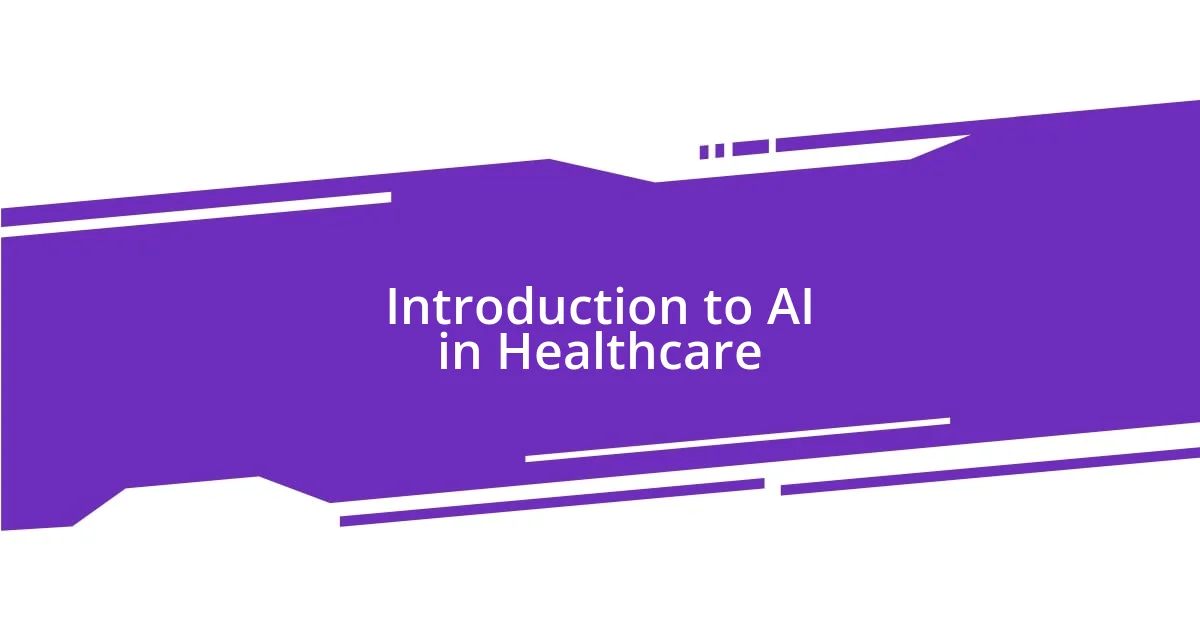
Introduction to AI in Healthcare
AI is reshaping healthcare in ways I never imagined possible. From enhanced diagnostic tools to personalized treatment plans, it feels like we are stepping into a new era of medicine. I remember the first time I saw AI analyze a set of medical images; it was astonishing how quickly and accurately it could identify issues that even seasoned doctors might miss.
Reflecting on my experiences, I can’t help but wonder: how did we ever manage without this technology? The integration of AI allows for more precise predictions regarding patient outcomes, enabling healthcare providers to tailor their approaches. It’s a profound shift, and honestly, it fills me with hope for the future of patient care.
What strikes me most is how AI isn’t just a tool; it’s a partner in the healing process. The idea that algorithms can sift through mountains of data to uncover insights that inform treatment is both exciting and a little daunting. It’s a game-changer, fostering collaboration between technology and healthcare professionals that ultimately benefits patients. What could be more rewarding than that?
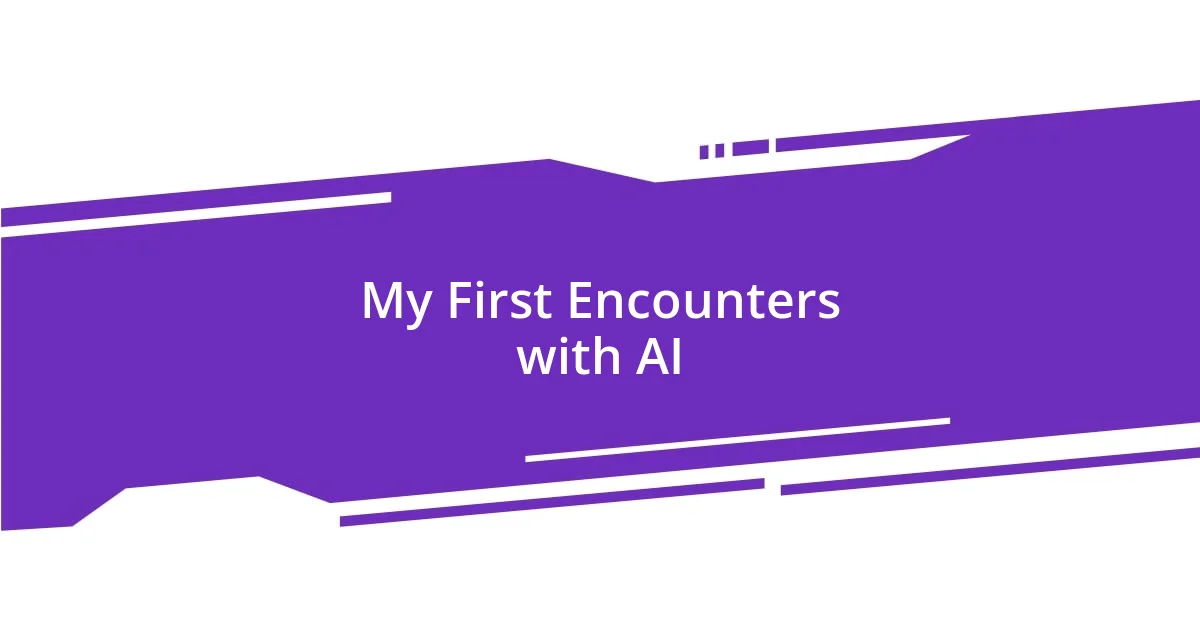
My First Encounters with AI
When I first encountered AI in healthcare, it was during a seminar on medical imaging. I watched as a presenter demonstrated an AI system analyzing thousands of MRI scans in mere seconds. The most striking moment for me was when it identified a rare tumor type that had eluded even expert radiologists. I felt a rush of excitement and curiosity—could this technology be a game changer for early detection and treatment?
A few weeks later, I had a chance to interact with an AI-driven chatbot designed for patient triage. I remember feeling skeptical at first. Could a program really understand complex human emotions and clinical symptoms? However, through my interactions, I found it surprisingly adept at guiding patients to the right care, and I began to appreciate the balance it strikes between efficiency and empathy. It dawned on me that this wasn’t just about replacing human roles but enhancing the overall patient experience in ways I hadn’t anticipated.
Then there was an inspiring case in my own clinic where AI played a crucial role in outlining a personalized treatment plan for a patient. The precision of the recommendations based on their unique genetics and history was both impressive and reassuring. I vividly recall the patient’s relief and gratitude, knowing that we were using cutting-edge technology to tailor their treatment. It made me realize how AI can genuinely empower us to provide better patient-centered care.
| Encounter | Reaction |
|---|---|
| Medical Imaging AI | Excitement and curiosity about early detection capabilities |
| Chatbot Interaction | Skepticism turned into appreciation for patient support |
| Personalized Treatment Planning | A sense of empowerment and reassurance for the patient |
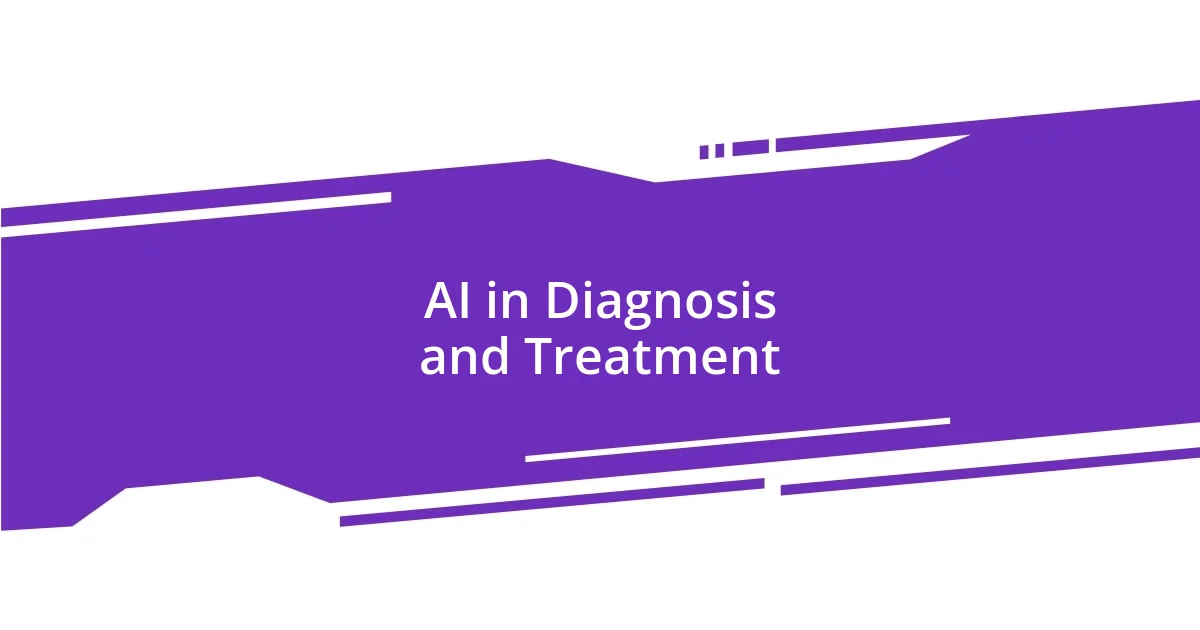
AI in Diagnosis and Treatment
When I think about AI in diagnosis and treatment, one instance resonates powerfully. I was present during a case where an AI tool reviewed a huge dataset of patient symptoms and histories, ultimately guiding us to a diagnosis that was surprisingly rare. I felt a blend of excitement and gratitude as my team and I validated the AI’s findings. It’s remarkable how AI can unearth hidden connections we might overlook, leading to life-changing interventions for patients.
- Enhanced accuracy in diagnosing complex conditions.
- Speedy analysis of vast medical data for quicker decision-making.
- Support in devising tailored treatment plans based on individual patient profiles.
There’s a poignant story that stands out in my mind. A few months ago, I encountered a patient struggling with a chronic illness. We utilized an AI system to recommend treatment options, drawing from the latest research and previous patient outcomes. The relief on the patient’s face when I detailed our plan, backed by cutting-edge technology, was unforgettable. It wasn’t just a treatment; it was the promise of hope and a more personal approach to healing. This blend of emotion and technology epitomizes the profound impact AI is having on patient care.
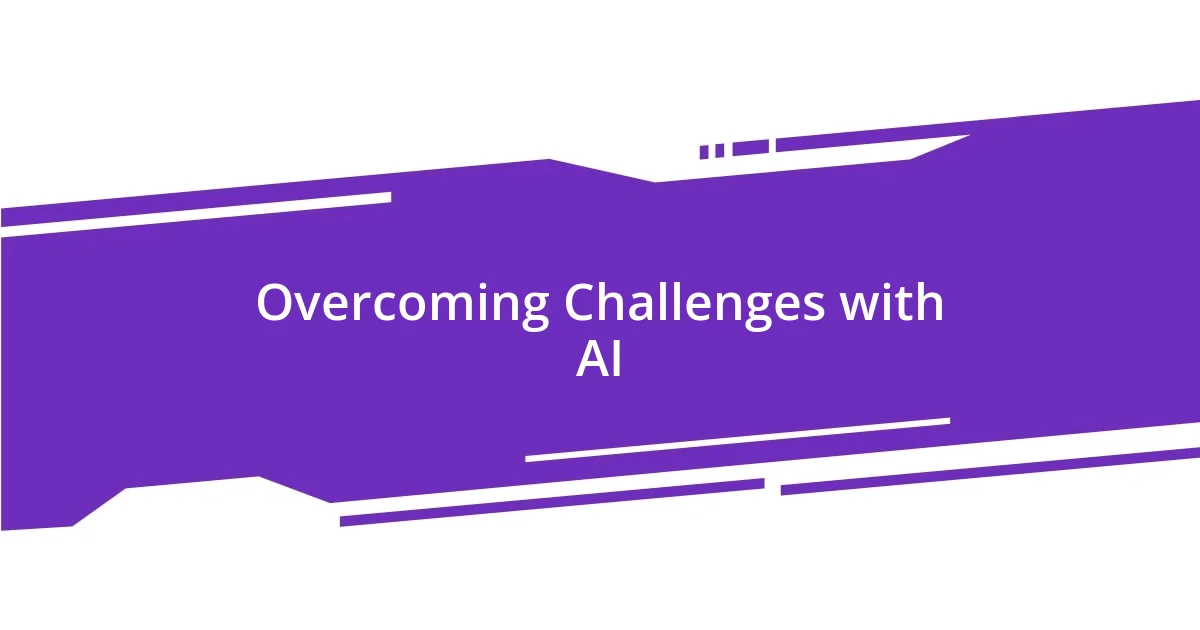
Overcoming Challenges with AI
Embracing AI in healthcare has not been without its challenges, particularly when it comes to data privacy and security. I remember attending a workshop where we discussed how sensitive patient information must be safeguarded as we integrate these innovative systems. It struck me: how can we provide cutting-edge care without compromising trust? It’s a delicate balancing act, but establishing stringent protocols and transparent practices can set the foundation for safe and effective AI deployment.
There was a moment in my practice when we faced pushback from staff wary of relying on AI for clinical decisions. I chuckled at the initial resistance; I had felt that same skepticism not long before. So, I organized a hands-on demo, encouraging everyone to interact with the AI system. Watching their hesitance transform into enthusiasm as they realized the technology could serve as a valuable ally opened my eyes. The light bulb moments when people see the potential of AI are genuinely rewarding; it fosters an environment where technology and human expertise complement each other rather than compete.
Training and integrating AI into existing workflows is another hurdle I’ve encountered. In my experience, aligning AI tools with our daily operations requires patience and open-mindedness. For instance, I vividly recall our initial attempts where we faced technical glitches that derailed our plans. Instead of getting frustrated, we gathered for feedback sessions. It was enlightening to find that when team members shared their insights, we not only overcame the hiccups but also improved how the AI served our needs. This collaborative spirit didn’t just enhance our practice; it solidified my belief that overcoming challenges with AI is a team effort rooted in communication and adaptability.

Lessons Learned from My Journey
One major lesson I’ve learned on this journey is the importance of continuous learning. There was a time when I thought I had a firm grasp of AI technologies. However, after attending a series of seminars, I realized I was just scratching the surface. Every session revealed new insights that reshaped my understanding and opened the door to innovative applications. Staying curious not only keeps me updated but also fuels my passion for integrating AI into healthcare.
I vividly remember a challenging moment a few months back when a newly implemented AI system misjudged a patient’s medical history. I felt a wave of frustration wash over me, and I worried about the implications. But rather than retreat, I convened a focused discussion with my team. We dissected the failure, which turned into an invaluable learning opportunity. These moments have taught me that errors don’t signify defeat; they reveal pathways to improvement and deeper understanding.
Moreover, I’ve come to appreciate the power of storytelling in communicating AI’s value. I once shared a success story with my colleagues about a patient whose treatment transformed due to AI recommendations. Watching their faces light up as I detailed the positive outcome reinforced my belief that we need to connect emotionally with our work. Isn’t it fascinating how a single story can spark enthusiasm and commitment to leveraging technology for better patient outcomes? I’ve seen firsthand how storytelling can bridge the gap between skepticism and belief in AI’s potential.












